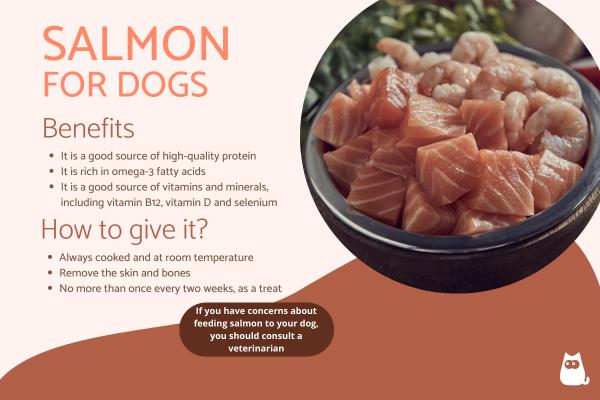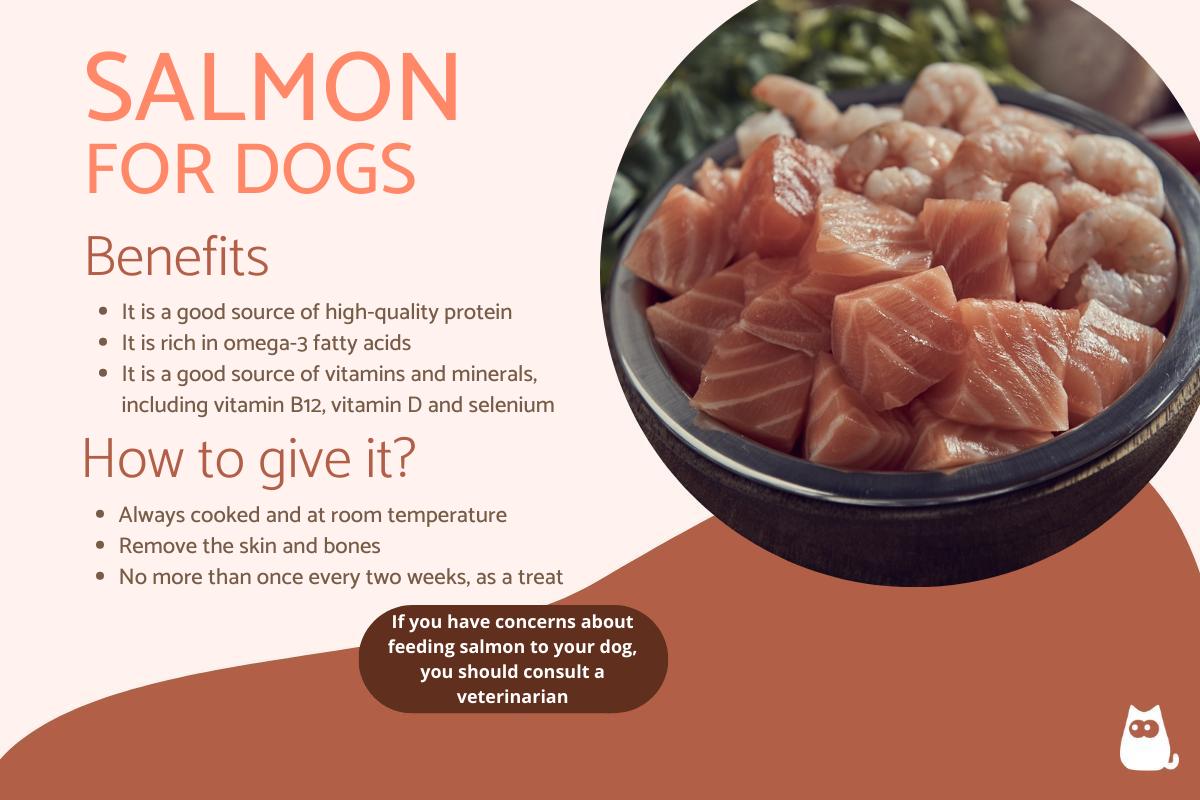Can Dogs Eat Salmon?



See files for Dogs
The popularity of salmon has steadily increased over the years, and it should not come as a surprise. Salmon is a type of fish known for its nutritional benefits, including being a good source of protein and healthy fats. Therefore, it is not uncommon for people to wonder if dogs can eat salmon and if it is safe and healthy for them. Although it is true that salmon can be a nutritious addition to a dog's diet, some precautions must be taken.
In the following AnimalWised article you will learn if salmon is good for dogs, what benefits and side effects it has and how you can offer it.
Is salmon good for dogs?
Salmon can be good for dogs in moderation and when prepared correctly. Salmon is a good source of protein, omega-3 fatty acids, and vitamins such as B12 and D, which can benefit a dog's health.
While salmon can be a nutritious addition to a dog's diet, there are some precautions that should be taken. Raw or undercooked salmon may contain harmful bacteria that can cause food poisoning, and some types of fish may contain bones that can pose a choking hazard or injure a dog's digestive tract. In addition, some seasonings and sauces used to prepare salmon may contain ingredients that are toxic to dogs, such as garlic and onions.
It's also important to note that some dogs may be allergic to salmon or other types of fish, so it's best to introduce it to your dog's diet in small amounts and monitor their reaction.
Overall, salmon can be a healthy and nutritious addition to a dog's diet when served properly, but it's always best to consult with a veterinarian before making any changes to your dog's diet.

Benefits of salmon for dogs
Salmon can provide several benefits for dogs when included in the diet in moderation and prepared properly. Here are some of the benefits of salmon for dogs:
- Rich in protein: salmon is a good source of high-quality protein, which is essential for building and repairing tissues in the dog's body.
- Omega-3 fatty acids: is rich in omega-3 fatty acids, which have an anti-inflammatory effect, support heart and brain health, and promote healthy skin and coat.
- Vitamins and minerals: is also a good source of vitamins and minerals, including vitamin B12, vitamin D and selenium, which can support the overall health of the dog.
- May reduce the risk of heart disease: The omega-3 fatty acids in salmon may help lower blood pressure and reduce the risk of heart disease in dogs.
- May support joint health: The anti-inflammatory effects of omega-3 fatty acids may also help reduce inflammation in joints, which can be beneficial for dogs with joint problems like arthritis.
You may also be interested in this other article, where we look at the best omega-3 rich food for dogs.
How to give salmon to dogs?
When giving salmon to dogs, it's important to prepare it correctly and serve it in a way that is safe and healthy for your dog. Here are some steps to follow:
- Choose the right salmon: Look for fresh, high-quality salmon that is free from bones and is not seasoned with any added spices or sauces.
- Cook the salmon: Cook the salmon thoroughly to kill any bacteria or parasites that may be present. You can boil, bake, or grill the salmon, but avoid using any oils or seasonings.
- Remove the skin and bones: Once the salmon is cooked, remove the skin and any bones before serving it to your dog. The skin can be difficult for dogs to digest, and the bones can pose a choking hazard or cause injury to their digestive tract.
- Serve in small portions: Give your dog a small portion of salmon, starting with just a few bites to see how they tolerate it. Avoid giving your dog large portions, as this can cause digestive upset.
- Monitor your dog's reaction: Watch your dog closely after feeding them salmon to ensure they are tolerating it well. If you notice any signs of digestive upset or allergic reaction, such as vomiting, diarrhea, or itching, stop feeding them salmon and consult with a veterinarian.
You may also be interested in this other article, where we talk about what the BARF diet is for dogs, as well as some tips and a sample menu.

Dosage of salmon for dogs
The proper dosage of salmon for dogs may depend on several factors, including the dog's size, age, and health status, as well as its individual nutritional needs.
A general guideline for feeding salmon to dogs is to give them no more than 1–2 servings per week. The serving size may depend on the size of the dog, but in general, a small dog should not get more than a 1 ounce (ca. 38 g) serving, while a larger dog can get up to 4 ounces (ca. 151 g) per serving.
If you have concerns about feeding salmon to your dog, you should consult a veterinarian to determine if the food is appropriate for your dog's individual nutritional needs and health status.
Side effects of salmon for dogs
Eating salmon can be associated with a number of health risks for our dogs, especially if the recommendations we have mentioned throughout the article are not followed. These are the side effects of salmon for dogs:
- Parasites: Like other fish, salmon can be parasitized by nematodes of the genus Anisakis.
- Bacteria: in addition to parasites, salmon may also contain pathogenic microorganisms such as Enterobacteriaceae, Aeromonas, etc., which can lead to food poisoning.
- Bones: Some types of salmon may contain bones that can pose a choking hazard or cause injury to a dog's digestive tract. Therefore, it's important to prepare salmon correctly by removing any bones before feeding it to your dog.
- Mercury: Some types of fish, including salmon, may contain high levels of mercury, which can be harmful to dogs when consumed in large amounts. Therefore, it's best to feed salmon to dogs in moderation and not as a primary source of protein.
You may also be interested in this other article, where we discuss whether tuna is safe for dogs.

Contraindications of salmon for dogs
Although salmon is a suitable food for dogs, there are certain exceptions in which its contribution is not recommended:
- Dogs that require a low-fat diet: as in the case of dogs with obesity, gastroenteritis, IBD, or pancreatitis.
- Dogs with allergies or food intolerances: However, there are hypoallergenic salmon-based diets that are best suited for dogs with these conditions.
- Dogs taking medications: The omega-3 fatty acids in salmon can interact with certain medications, such as blood thinners. Therefore, it is best to talk to your veterinarian if your dog is taking medication.
You may also be interested in this other article, where we talk about food allergies in dogs.
If you want to read similar articles to Can Dogs Eat Salmon?, we recommend you visit our Homemade diets category.
Ministry of Agriculture, Fisheries and Food. Salmon. salty psalm Available at: https://www.mapa.gob.es/es/ministerio/servicios/informacion/salmon_tcm30-102435.pdf








